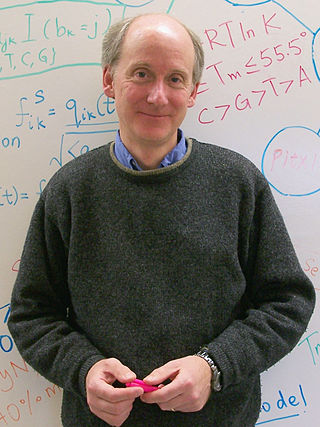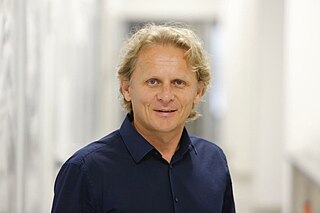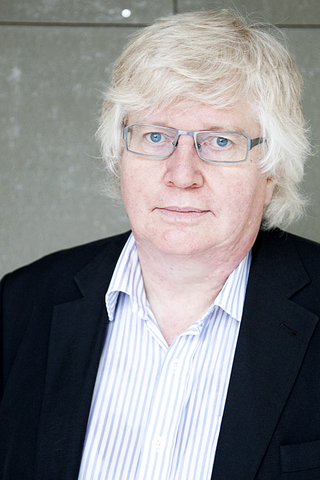Related Research Articles

Linköping University is a public research university based in Linköping, Sweden. Originally established in 1969, it was granted full university status in 1975 and is one of Sweden's largest academic institutions.

George Emil Palade was a Romanian-American cell biologist. Described as "the most influential cell biologist ever", in 1974 he was awarded the Nobel Prize in Physiology and Medicine along with Albert Claude and Christian de Duve. The prize was granted for his innovations in electron microscopy and cell fractionation which together laid the foundations of modern molecular cell biology, the most notable discovery being the ribosomes of the endoplasmic reticulum – which he first described in 1955.

Sydney Brenner was a South African biologist. In 2002, he shared the Nobel Prize in Physiology or Medicine with H. Robert Horvitz and Sir John E. Sulston. Brenner made significant contributions to work on the genetic code, and other areas of molecular biology while working in the Medical Research Council (MRC) Laboratory of Molecular Biology in Cambridge, England. He established the roundworm Caenorhabditis elegans as a model organism for the investigation of developmental biology, and founded the Molecular Sciences Institute in Berkeley, California, United States.

Howard Robert Horvitz ForMemRS NAS AAA&S APS NAM is an American biologist best known for his research on the nematode worm Caenorhabditis elegans, for which he was awarded the 2002 Nobel Prize in Physiology or Medicine, together with Sydney Brenner and John E. Sulston, whose "seminal discoveries concerning the genetic regulation of organ development and programmed cell death" were "important for medical research and have shed new light on the pathogenesis of many diseases".

Mario Ramberg Capecchi is an Italian-born molecular geneticist and a co-awardee of the 2007 Nobel Prize in Physiology or Medicine for discovering a method to create mice in which a specific gene is turned off, known as knockout mice. He shared the prize with Martin Evans and Oliver Smithies. He is currently Distinguished Professor of Human Genetics and Biology at the University of Utah School of Medicine.

James Alexander Thomson is an American developmental biologist best known for deriving the first human embryonic stem cell line in 1998 and for deriving human induced pluripotent stem cells (iPS) in 2007.
Brigid L. M. Hogan FRS is a British developmental biologist noted for her contributions to mammalian development, stem cell research and transgenic technology and techniques. She is currently a Professor in the Department of Cell Biology at Duke University, Born in the UK, she became an American citizen in 2000.

Jan-Åke Gustafsson is a Swedish scientist and professor in Biology, Biochemistry and Medical Nutrition. When he decided to move to Houston, Texas, USA, in 2008, the State of Texas decided to give a major US $5.5 million research grant to the University of Houston, enabling the establishment of the Center of Nuclear Receptors and Cell Signaling under the leadership of Jan-Åke Gustafsson. The grant was announced at a February 5, 2009, press conference by Rick Perry, Governor of Texas and running for the Republican nomination for President of the United States in the 2012 presidential election.
Hans Robert Schöler is a molecular biologist and stem cell researcher. He is director at the Max Planck Institute for Molecular Biomedicine in Münster.
Utpal Banerjee is a distinguished professor of the department of molecular, cell and developmental biology at UCLA. He obtained his Bachelor of Science degree in chemistry from St. Stephen's College, Delhi University, India and obtained his Master of Science degree in physical chemistry from the Indian Institute of Technology, Kanpur, India. In 1984, he obtained a PhD in chemistry from the California Institute of Technology where he was also a postdoctoral Fellow in the laboratory of Seymour Benzer from 1984-1988.
The Fernström Prize is a series of annual awards for prominent Swedish and Nordic scientists in medicine. The prize money is donated by the Eric K. Fernström' Foundation. The prizes are managed by the medical faculty at Lund University.
Andrea Hilary Brand is the Herchel Smith Professor of Molecular Biology and a Fellow of Jesus College, Cambridge. She heads a lab investigating nervous system development at the Gurdon Institute and the Department of Physiology, Development and Neuroscience. She developed the GAL4/UAS system with Norbert Perrimon which has been described as “a fly geneticist's Swiss army knife”.

Ivan Đikić is a Croatian-German molecular biologist who is the Director of the Institute of Biochemistry II at Goethe University Frankfurt.

Lucy Shapiro is an American developmental biologist. She is a professor of Developmental Biology at the Stanford University School of Medicine. She is the Virginia and D.K. Ludwig Professor of Cancer Research and the director of the Beckman Center for Molecular and Genetic Medicine.
Carl-Henrik Heldin is Chairman of the Board for the Nobel Foundation, and a molecular biologist and medical researcher. He has been director of the Uppsala branch of Ludwig Cancer Research since 1986 and professor in molecular cell biology at the medical faculty of Uppsala University since 1992. He is vice-president of the European Research Council since 2011 and was appointed chairman of the Nobel Foundation in 2013.

Stefan Karlsson is a Professor of Molecular Medicine and Gene Therapy at the Lund Stem Cell Center, in the Department of Laboratory Medicine, Lund University, Sweden. He is recognized for significant contributions to the fields of gene therapy and hematopoietic stem cell biology and in 2009 was awarded the Tobias Prize by The Royal Swedish Academy of Sciences.

Emmanuelle Marie Charpentier is a French professor and researcher in microbiology, genetics, and biochemistry. As of 2015, she has been a director at the Max Planck Institute for Infection Biology in Berlin. In 2018, she founded an independent research institute, the Max Planck Unit for the Science of Pathogens. In 2020, Charpentier and American biochemist Jennifer Doudna of the University of California, Berkeley, were awarded the Nobel Prize in Chemistry "for the development of a method for genome editing". This was the first science Nobel Prize ever won by two women only.
Sardul Singh Guraya was an Indian biologist, known for his contributions in the fields of reproductive physiology and Developmental biology. He was an elected fellow of the Indian National Science Academy, National Academy of Sciences, India and National Academy of Agricultural Sciences. The Council of Scientific and Industrial Research, the apex agency of the Government of India for scientific research, awarded him the Shanti Swarup Bhatnagar Prize for Science and Technology, one of the highest Indian science awards, in 1973, for his contributions to biological sciences.

Melissa Helen Little is an Australian scientist and academic, currently Theme Director of Cell Biology, heading up the Kidney Regeneration laboratory at the Murdoch Children's Research Institute. She is also a Professor in the Faculty of Medicine, Dentistry and Health Sciences, University of Melbourne, and Program Leader of Stem Cells Australia. In January 2022, she became CEO of the Novo Nordisk Foundation Center for Stem Cell Medicine reNEW, an international stem cell research center based at University of Copenhagen, and a collaboration between the University of Copenhagen, Denmark, Murdoch Children’s Research Institute, Australia, and Leiden University Medical Center, The Netherlands.
Davor Solter is a Yugoslavian-born developmental biologist, particularly known for his pioneering work on mammalian genomic imprinting. He is Emeritus Member and Director, Max Planck Institute of Immunobiology and Epigenetics; Visiting International Professor, Siriraj Center for Excellence in Stem Cell Research, Mahidol University, Thailand; and Visiting Professor, University of Zagreb Medical School.
References
- ↑ Professorial inauguration, Spring 2004, Linköping University.
- ↑ "Stefan Thor". Linköping University . Retrieved 2011-10-25.
- ↑ "Stefan Thor receives the Fernström Prize". Linköping University . Retrieved 2011-10-25.